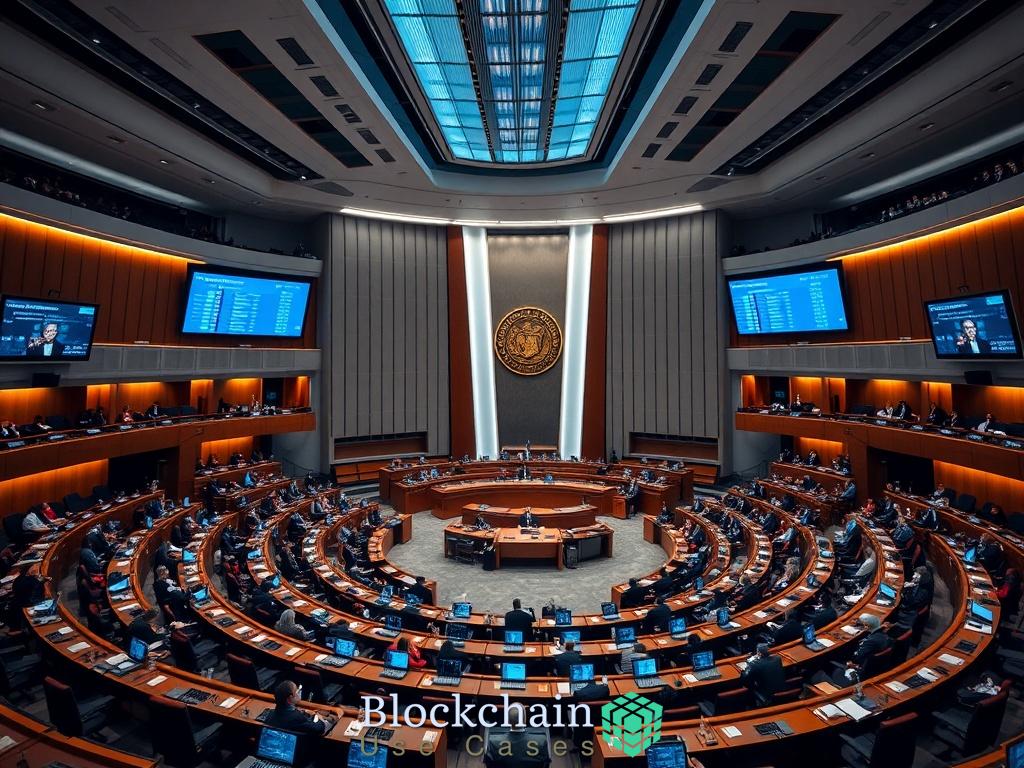Enhancing Accountability through Blockchain

In an era where transparency and accountability are paramount, the integration of blockchain technology into parliamentary voting procedures represents a significant advancement. By leveraging the unique properties of blockchain—its decentralization, immutability, and transparency—governments can enhance the integrity of their voting processes, ensuring that every vote is counted, and every action is recorded without the possibility of tampering.
Implementing blockchain in parliamentary voting can lead to numerous benefits, fundamentally altering how votes are cast and recorded. Here are some of the most compelling advantages:
- Increased Transparency: Every transaction on a blockchain is recorded publicly, allowing for real-time access to voting data.
- Enhanced Security: The use of cryptography and decentralized verification minimizes the risk of fraud and manipulation.
- Auditability: Blockchain provides an immutable record, making it easier to audit and verify voting outcomes.
- Voter Confidence: Knowing that the voting process is secure and transparent can increase public trust in governmental institutions.
The following table illustrates a comparison between traditional voting systems and blockchain-based voting systems, highlighting the disparities in accountability, security, and transparency:
| Criterion | Traditional Voting | Blockchain Voting |
|---|---|---|
| Transparency | Limited access to voting records | Publicly accessible and verifiable |
| Security | Vulnerable to manipulation | Highly secure due to cryptographic protocols |
| Audit Trail | Difficult to trace | Immutable and easily auditable |
| Public Trust | Often questioned | Significantly enhanced |
Real-Time Voting Transparency

The advent of blockchain technology has paved the way for unprecedented levels of real-time voting transparency in parliamentary procedures. By integrating this innovative technology into the voting ecosystem, the entire process shifts from a closed-door operation to an open, verifiable system accessible to all stakeholders. This transformation not only enhances the credibility of the voting process but also empowers citizens by providing them with the information they need to hold their elected officials accountable.
One of the most compelling aspects of blockchain is its ability to offer a transparent view of the voting process as it unfolds. With every vote being recorded on a decentralized ledger, stakeholders can monitor the voting live, ensuring that every action is documented and visible. This level of transparency means that any irregularities can be identified in real-time, allowing for swift corrective measures. Traditional voting systems often leave citizens in the dark, but blockchain technology illuminates the entire process, fostering an environment of trust and confidence.
Moreover, the utilization of smart contracts within blockchain voting systems facilitates automatic updates and notifications as votes are cast and counted. This automation ensures that all participants, from election officials to the general public, receive timely information about voter turnout and results. The implications are profound; citizens are not merely passive observers but active participants in a democratic process that values openness and engagement. As a result, public confidence in the voting system is significantly bolstered.
In summary, the move towards blockchain-enabled voting systems marks a pivotal moment in the evolution of electoral integrity. By harnessing real-time transparency, governments can not only safeguard the sanctity of elections but also cultivate a more informed and engaged electorate. This level of transparency redefines the relationship between voters and their representatives, ensuring that the democratic process remains robust and resilient in the face of modern challenges.
Decentralized Audit Trails for Voting Integrity
As democratic processes continue to evolve, the importance of robust audit mechanisms in parliamentary voting cannot be overstated. In a landscape where public trust is paramount, the integration of blockchain technology introduces a revolutionary approach to auditing. Decentralized audit trails not only establish an unalterable record of every vote cast but also empower stakeholders to verify the integrity of the voting process in real-time. By moving away from traditional audit methods, which often rely on centralized systems prone to manipulation, blockchain offers a more resilient framework that assures the electorate of the legitimacy of outcomes.
The decentralized nature of blockchain fundamentally transforms the way audits are conducted. With every transaction recorded on a public ledger, the audit process becomes inherently transparent; any participant can access and verify the voting data without the need for intermediaries. This level of transparency is crucial in fostering a culture of accountability. By allowing independent audits to take place in real-time, stakeholders can quickly identify discrepancies, thus enhancing overall confidence in the electoral process. Moreover, the immutable nature of blockchain ensures that once a vote is recorded, it cannot be altered or erased, providing an unprecedented level of security.
In addition to transparency, the reliance on immutable records significantly bolsters public trust in parliamentary voting systems. Traditional voting methods often leave room for doubt regarding the accuracy of the results, as discrepancies can arise from human error or intentional manipulation. In contrast, the blockchain’s ability to create a permanent and verifiable trail of all voting activities eliminates these concerns. Citizens can engage with the voting data knowing that it is both accurate and protected from tampering. This transformation not only reassures constituents but also elevates the integrity of the representatives they elect. As a result, the relationship between the electorate and their elected officials is strengthened, fostering a more engaged and informed citizenry.
Smart Contracts in Parliamentary Voting
The introduction of smart contracts within the realm of parliamentary voting represents a transformative approach to governance and democracy. By automating processes and enforcing the rules of engagement, smart contracts leverage the capabilities of blockchain technology to streamline voting procedures while ensuring compliance and integrity. This not only enhances operational efficiency but also fosters a culture of accountability among elected officials and constituents alike.
Automating Compliance and Enforcement
Smart contracts are self-executing contracts with the terms of the agreement directly written into code. In the context of parliamentary voting, these contracts can automatically enforce voting rules and regulations. For example, they can manage eligibility criteria, ensuring only authorized voters participate in the election process. This functionality reduces the potential for human error and manipulation, thus safeguarding the democratic process.
Furthermore, smart contracts can automate the counting of votes and the announcement of results. This means that once the voting period concludes, the results can be processed and published almost instantaneously. Such immediacy not only increases the efficiency of the electoral process but also enhances transparency, as all participants can verify the outcome in real time.
Enhancing Voter Engagement Through Transparency
One of the most compelling advantages of smart contracts in parliamentary voting is their ability to promote active citizen engagement. By providing voters with clear visibility into how their votes are counted and how decisions are made, smart contracts cultivate a more informed electorate. Voters can track their individual voting actions and verify their participation in the democratic process.
Moreover, the transparency afforded by smart contracts means that all voting actions are recorded on a publicly accessible blockchain. This visibility empowers citizens to hold their representatives accountable, knowing that they can audit the voting process if necessary. Voter engagement is further enhanced through notifications and updates, which can be programmed into the smart contracts to inform citizens of key milestones in the voting process.
Key Advantages of Smart Contracts in Voting
The following list outlines the primary benefits of integrating smart contracts into parliamentary voting systems:
- Automation: Streamlines voting procedures, reducing manual involvement and the likelihood of errors.
- Real-time Processing: Facilitates immediate results, promoting transparency and reducing waiting times.
- Enhanced Accountability: Provides a verifiable record of voting actions, increasing public trust in the electoral process.
- Increased Engagement: Empowers voters with information and visibility, fostering a more active citizenry.
In conclusion, the implementation of smart contracts in parliamentary voting is not merely an advancement in technology; it is a significant step toward a more transparent and accountable democratic process. By automating and securing the voting experience, smart contracts pave the way for a future where citizens can engage meaningfully with their governments, ensuring that democracy remains robust and responsive to the needs of the people.
Public Engagement and Trust via Blockchain
The shift towards blockchain technology in parliamentary voting not only revolutionizes the mechanics of the electoral process but also serves as a catalyst for enhancing public engagement and trust. As citizens become more informed about the voting systems that govern them, their involvement in the democratic process deepens. Blockchain’s inherent attributes of transparency and immutability foster an environment where voters feel empowered and confident in the integrity of their electoral system.
Building Bridges of Trust through Visibility is one of the most significant impacts of blockchain on public engagement. Unlike traditional voting systems, where procedures often remain opaque, blockchain provides an unassailable record of every vote cast. This transparency allows citizens to observe the voting process in real-time, effectively bridging the gap between the electorate and their elected officials. By having access to verifiable data, voters can not only track their own participation but also validate the overall voting outcomes, reinforcing their trust in the democratic process.
Moreover, the ability to utilize real-time updates and notifications through blockchain technology ensures that voters remain informed throughout the entire voting process. Citizens can receive automatic alerts regarding key developments, such as voter turnout and the counting of votes, which enhances their connection to the electoral landscape. This level of engagement transforms passive observers into active participants, encouraging a culture of involvement that is crucial for a thriving democracy.
Empowerment through Education is another vital component of public engagement facilitated by blockchain. As the public gains access to information about how the voting process operates, they become more educated voters. This educational aspect is essential for fostering an electorate that is not only informed but also engaged in civic discussions. Blockchain technology can serve as a platform for disseminating educational materials, allowing citizens to understand their rights, the voting process, and the importance of their participation. Through this empowerment, voters are more likely to engage in the democratic process, leading to increased turnout and a more representative government.
In conclusion, the integration of blockchain technology in parliamentary voting procedures marks a transformative step towards a more transparent and accountable democratic process. By fostering public trust through visibility, real-time engagement, and education, blockchain not only redefines the relationship between voters and their representatives but also strengthens the foundations of democracy itself. As citizens embrace this new era of transparency, the potential for a more engaged and informed electorate becomes a reality, paving the way for a resilient and responsive democratic system.





